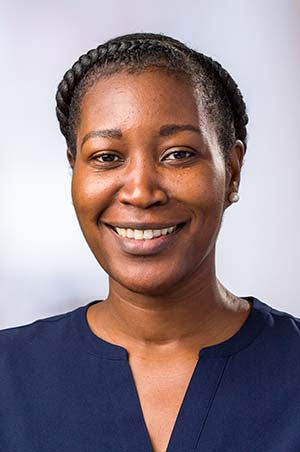
Faculty Spotlight: Dr. Rachel Issaka
March is Colorectal Cancer Awareness Month. This month we are spotlighting Dr. Rachel Issaka, assistant professor (Gastroenterology) who specializes in digestive issues associated with cancer or cancer treatment, including colorectal cancer.
Combating racial disparities in colorectal cancer
Dr. Rachel Issaka is a gastroenterologist at Seattle Cancer Care Alliance (SCCA) and UW Medical Center and a health services researcher with the Fred Hutchinson Institute for Cancer Outcomes Research. She specializes in digestive issues associated with cancer or cancer treatment. Dr. Issaka’s research is dedicated to reducing racial disparities in colorectal cancer outcomes by developing novel ways to reach, screen, and ensure follow-up for individuals eligible for colorectal cancer screening.
Colorectal cancer is the second highest cause of cancer deaths in the U.S. and the American Cancer Society estimate that about 1 in 21 men and 1 in 23 women in the United States will develop colorectal cancer during their lifetime.
Colorectal cancer can be asymptomatic, and early cases can begin as noncancerous polyps. Because occurrence is relatively common and early detection can yield a better prognosis, routine screening is recommended for adults starting between ages 45 and 50. Stool-based testing is a common strategy for colorectal cancer screening and an abnormal stool-based test result must be followed by a colonoscopy.
Through her research, Issaka identified that colonoscopy completion rates after an abnormal screening test are less than optimal, particularly for patients in racial/ethnic minority and low-income populations.
“Colorectal cancer disproportionately affects the Black community, where the rates are the highest of any racial/ethnic group in the US. African Americans are about 20% more likely to get colorectal cancer and about 40% more likely to die from it than most other groups.” -American Cancer Society
As catching colorectal cancer in its earliest stages can be crucial to preventing serious illness and death, Issaka has devoted her research to improving the screening and diagnosis process, particularly for minority and low income populations who are at higher risk. Through a grant by the National Cancer Institute, Issaka is leading a team to identify modifiable barriers to completing screening tests and subsequent colonoscopy at Harborview Medical Center.
“Our findings will inform an intervention to eliminate these barriers for patients at Harborview Medical Center and other safety-net settings,” says Issaka.
Advocating for change
Issaka is a leading voice for improving cancer care, reducing health disparities and prioritizing equity, diversity and inclusion in healthcare through local and national advocacy work.
“My most memorable moments are when I get to work with learners (fellows, residents, and students), engage with local communities, and contribute to local and national health policy,” shares Issaka.
Issaka spreads awareness of and advocates for policies to reduce disparities in cancer care by serving as a colorectal cancer advisor to the President’s Cancer Panel, and recently delivering the keynote address at the World Cancer Day Symposium hosted by the Cierra Sisters - a support and advocacy organization for Black women who are diagnosed with, or survivors of, cancer.
To improve diversity and inclusion within the medical profession, Issaka has organized professional groups aimed at advancing the careers of women physicians and physicians from historically underrepresented groups in medicine. At the UW, Issaka founded the Women in Gastroenterology Interest Group to provide a space for women colleagues to discuss common challenges and celebrate victories. She is also a founding member of the Association of Black Gastroenterologists and Hepatologists.
“Earlier this year, in collaboration with 11 colleagues around the country, we launched the Association of Black Gastroenterologists and Hepatologists (ABGH),” said Issaka.
“The mission of ABGH is to promote health equity in Black communities, advance science, and develop the careers of Black gastroenterologists, hepatologists and scientists.“
Collaborating toward equity
In collaboration with UW Gastroenterology fellow Dr. Oviea Akpotaire, Issaka and Akpotaire recently published “Microaggressions, racism, and antiracism: The role of gastroenterology” in GI & Hepatology News.
In the article, Issaka and Akpotaire discuss how microaggressions and racism impact physicians and patients and the ways in which individuals, organizations and governments can engage in antiracist actions to address biases and improve equity.
Issaka’s clinical, research, and advocacy work propel her toward a goal of contributing to a more equitable world:
“I look forward to the elimination of persistent racial, ethnic, and socioeconomic disparity gaps in colorectal cancer. More broadly, I look forward to realizing health equity across multiple diseases. And I also look forward to increased racial, ethnic, and gender diversity – in representation and in leadership – within my specialty and across academia.”
Read more
Issaka further discusses the need for the medical field to dismantle structural racism in a 2020 interview with Stat News. The article “‘We have to do a better job’: How structural racism in medicine harms both doctors and patients” followed her publication of her essay “Good for All of Us” in the Journal of the American Medical Association.